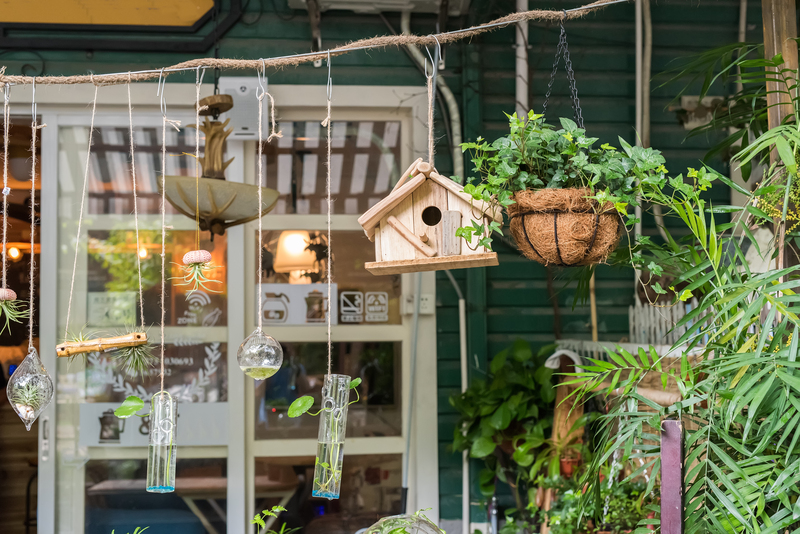Finding Recycling Centers for Pans and Pots in Your Area
Are you wondering what to do with your old cookware? Disposing of pans and pots in the regular trash isn't the best solution for our environment. Fortunately, many recycling centers now accept these common household items. This comprehensive guide will help you locate the best recycling options in your area and teach you how to recycle cookware like a pro!

Why Recycle Pans and Pots?
Recycling cookware isn't just about saving space in the landfill--it's also about conserving resources and protecting the environment. Most pots and pans are made from valuable materials like aluminum, stainless steel, or copper, all of which can be repurposed into new products. When you recycle your old pans and pots, you:
- Reduce landfill waste by diverting bulky items from your local dump
- Conserve natural resources by enabling manufacturers to reuse metals
- Lower carbon emissions compared to the mining and processing of new metals
- Support your local recycling economy by providing materials to regional industries
It's not always obvious where to recycle old cookware, but with a bit of know-how, you can ensure your pots and pans are responsibly processed.
How to Prepare Cookware for Recycling
Before dropping off your old pans and pots at a recycling center, a few steps will enhance the chances of them being accepted for recycling:
- Check for Non-Metal Parts: Many pots and pans have plastic handles, rubber grips, or glass lids. These often need to be removed, as most recycling centers only accept pure metals.
-
Spot the Metal Type:
- Aluminum: Lightweight, often used in non-stick pans.
- Stainless Steel: Heavier; magnetic test can help identify.
- Copper: Bright reddish metal, sometimes used in high-end cookware.
- Cast Iron: Heavy and dark, usually not accepted everywhere but still recyclable.
- Clean Thoroughly: Give the cookware a rinse to remove debris, grease, or food residue.
- Decide on Full or Partial Recycling: Sometimes, if non-stick coating is intact, it may be classified differently. Check with your local recycling center for their rules.
Where Can I Recycle Old Pans and Pots?
Finding local recycling centers for pans and pots may seem daunting, but several methods make it easy to find facilities near you:
1. Municipal Recycling Programs
Most cities and towns offer curbside recycling or drop-off sites that accept scrap metal items. Although cookware is not always accepted in curbside bins, many local waste facilities have designated scrap metal drop-off events or areas. Check your municipality's website or contact your city's department of public works for details.
2. Scrap Metal Yards
Scrap metal dealers often welcome a wide range of metals, including aluminum, stainless steel, and copper pots and pans. Some may even pay you for these metals (especially copper and aluminum items). Use Google Maps or Yellow Pages and search for terms like "scrap metal recycling near me" or "metal recycling center." Always call ahead to confirm cookware is accepted.
3. Appliance & Household Goods Recycling Centers
Some centers focus specifically on household items and accept old cookware. Organizations like Habitat for Humanity ReStores and local thrift shops may accept usable items for resale; others will recycle damaged goods.
4. Retailer Take-Back Programs
Large retailers such as Williams Sonoma, Target, or IKEA sometimes offer recycling programs or trade-in events for cookware. These initiatives are often tied to purchasing new items in-store. Visit the official websites or ask at the customer service desk.
5. Special Recycling Events
Be on the lookout for community recycling drives or zero-waste events that accept kitchenware. These are often organized around "Earth Day" or the spring cleaning season. Your local government, department of the environment, or community organizations will provide event information.
6. Online Recycling Locators
Several trusted online tools can help you find pans and pots recycling centers near you:
- Earth911 (search.earth911.com): Enter "cookware," "pots and pans," or the material type, along with your zip code.
- Recycling Locator by Call2Recycle: Useful for general queries and includes scrap metal facilities.
- Local Government Resource Pages: Many municipalities have their own search tools for recycling sites and materials.
What Types of Cookware Are Recyclable?
Not every piece of cookware is immediately eligible for recycling, so here's an overview of what typically is:
- Aluminum and Stainless Steel Pots & Pans: Most commonly accepted, with or without non-stick coatings (though coatings may need to be removed).
- Copper Pans: Highly valued in scrap yards.
- Cast Iron: Heavy, can be recycled at many facilities, sometimes requires special handling due to weight.
- Non-Stick Cookware: Some recycling centers reject items with Teflon or ceramic coatings; check before dropping off.
- Glass Lids: Usually not accepted with other glass recycling; can sometimes be included at specialized scrap yards.
Upcycling and Donating Old Pans & Pots
If your old cookware is still in decent shape, consider upcycling or donating before seeking out a recycling center for used pots and pans.
- Local Charities and Thrift Shops: Goodwill, Salvation Army, or Habitat for Humanity ReStores often accept working cookware.
- Community Shelters or Food Banks: Many organizations gladly accept gently used kitchen items for people in need.
- Online Marketplaces: Apps like Facebook Marketplace, Craigslist, or Freecycle can help your old pans and pots find a second home.
- Arts and Crafts: Old pots and pans can become creative planters, wall art, or even quirky bird baths for your garden!
Giving your old cookware a second life is an easy way to help others and reduce waste.
Recycling Cookware: Dos and Don'ts
- Do check with your local recycling program for specifics regarding pans, pots, and metals.
- Don't place cookware in your regular curbside recycling bin without confirmation.
- Do remove all plastic, rubber, or non-metal pieces as necessary.
- Don't try to recycle cookware items coated with asbestos or containing hazardous elements--contact your local hazardous waste authority for guidance.
- Do consider reselling or upcycling before opting to recycle, especially for items in good condition.
Benefits of Local Pot and Pan Recycling Centers
Why use a local recycling center for pans and pots? Beyond reducing your environmental footprint, local centers:
- Save time and money compared to shipping items elsewhere
- Support community-based businesses and jobs
- Allow for the proper sorting and handling of recyclable materials
- Reduce transportation-related carbon emissions
By utilizing local options, you ensure your pans and pots are processed in an eco-friendly, efficient, and community-driven manner.
What Happens After Recycling?
After you recycle your old pots and pans, what's next? Here's how your cookware completes its green journey:
- Cookware is sorted by metal type at the recycling facility.
- Non-metal parts are removed or separated using a magnet and manual sorting.
- The metal is shredded for easier melting and processing.
- It is then remelted and formed into raw materials for new products--sometimes even more cookware!
- Recycled metals find new life in everything from appliances and vehicles to infrastructure and art.
By learning how to recycle old pans and pots properly, you play a vital role in this circle of sustainability.

Frequently Asked Questions About Recycling Pans & Pots
Can non-stick pans be recycled?
Non-stick pans can be tricky. Traditional recycling centers may not accept Teflon-coated pans, but some scrap yards will. It's always best to call ahead and check rules for non-stick cookware recycling in your area.
Is recycling cookware free?
Most recycling centers accept pans and pots at no charge, while some scrap yards may offer cash for metals like copper and aluminum. Special recycling events may also provide free drop-off.
What about induction pans or cookware with combined materials?
Induction pans often have layers of different metals. As long as the main components are metallic, most scrap yards will accept them after any non-metal parts are removed.
Can I recycle cookware with wooden handles?
Generally, wooden or plastic handles should be removed before recycling pans and pots. Consult the recycling center's guidelines before you drop off mixed-material items.
Where can I find more information?
Visit your municipal recycling website or use reputable tools like Earth911 to find pans and pots recycling locations tailored to your area and material type.
Conclusion: Start Recycling Your Old Pans and Pots
Recycling your pans and pots is an impactful and simple way to protect the planet. With so many recycling centers for cookware available locally, there's no excuse to toss your old pots and pans into the trash.
- Check your municipality's rules on scrap metal recycling
- Search online directories for the nearest recycling facility
- Remove non-metal parts and clean your cookware before recycling
- Consider donating or upcycling before sending to recycle
Make a positive impact by responsibly recycling your old cookware! With the practical tips and resources in this guide, you can find the right recycling center for your pans and pots--helping your community and the environment in one easy step.
